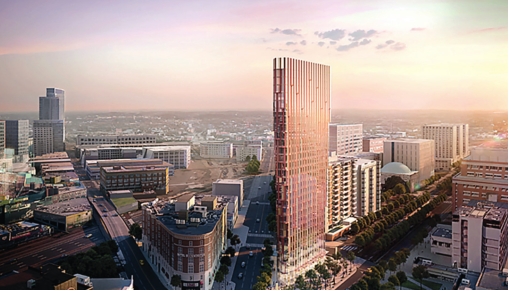
Proposed One Kenmore With economic headwinds putting many real estate projects across the city on hold for years, it falls to the Boston Planning Department (BPD) to decide how long is too long for an old plan to stay valid.
It can be hard to make construction budgets work at the best of times, but in recent years resurgent costs have seen a surge of high-profile projects pause their development after winning regulatory approval.
One Kenmore was a 29-story hotel and plaza proposal in the heart of Kenmore Square that finished public review in 2021. Today, market conditions apparently still haven’t recovered enough to make actually building it worth the cost.
“Like
a lot of projects, we are considering the broader financing,
construction and use environment and don’t have any news to report,”
said Diana Pisciotta, president of communications firm Denterlein and
spokesperson for proponent Mark Development.
“We
remain excited about the transformational project we have proposed in
Kenmore Square. Like all property developers, we are considering a
variety of strategies to move forward and assure that this project
creates maximum positive benefits for the city.”
She confirmed that Mark Development does not currently have any updates on when One Kenmore could proceed.
Air
rights parcel 13 at the intersection of Boylston Street and
Massachusetts Avenue is another example, where commercial developer The
Peebles Corporation proposed a 12-story building with lab space and 125
units of affordable housing. The project passed multiple rounds of
public examination in 2023, but since then has been radio silent.
Peebles did not respond by press time to requests for comment on the status of the project.
More
recently, the Franklin Cummings Institute admitted that it lost the
development partner for its old campus at 41 Berkeley Street. Originally
proposed in partnership with developer
Related Beal, the upscale senior care center passed public review
controversially for BPD approval in 2022. It continued to accrue
regulatory approvals as recently as 2024.
Continued,
that is, until a listing went up with international real estate broker
Colliers showing the property was now for sale, approved plans and all.
The Franklin Cummings Institute confirmed that Related Beal had backed
out and the project was on hold while they looked for another partner or
buyer for the property.
Developments
often promise neighbors mitigation funding and public improvements to
meet current needs. So what happens when those current needs are years
out of date by the time construction actually starts?
The relevant part of the city’s laws is Article 80 of the Boston Zoning Code, specifically section 80A-6.
Project
proponents are supposed to notify the BPD if changed plans or lapsed
time might subject a project to renewed review, though outside parties
can as well. The standard time limit for a period to be “considered
significant” is three years between the submission of a project and the
next step in development.
If
a change of lapse in time is significant, the director of the BPD is
the one who decides what, if any, parts of the plan need to be
reexamined. The director’s discretion here is broad, but Article 80 does
suggest considering increased size, use, traffic, changes to completion
schedule or zoning, and changes in the project site or surroundings.
Notably
the literal text seems to only mention a three-year period between a
submission and its approval as significant, not necessarily after
approval, but the BPD gave a statement in response to The Boston Guardian’s questions that suggested the director’s judgement applies to completed processes like One Kenmore as well.
“The
director of the BPD has discretion to consider whether a lapse of time
following a project's approval significantly increases the impacts of
the project and therefore requires new or updated filings and additional
review,” it said.
While
the BPD does not regularly check unbuilt projects, it does take a look
before a final building permit is granted. The agency was less specific
about what it considers during those judgements.
“Each project is unique and would include a review of all relevant circumstances specific to that project,” a spokesperson said.